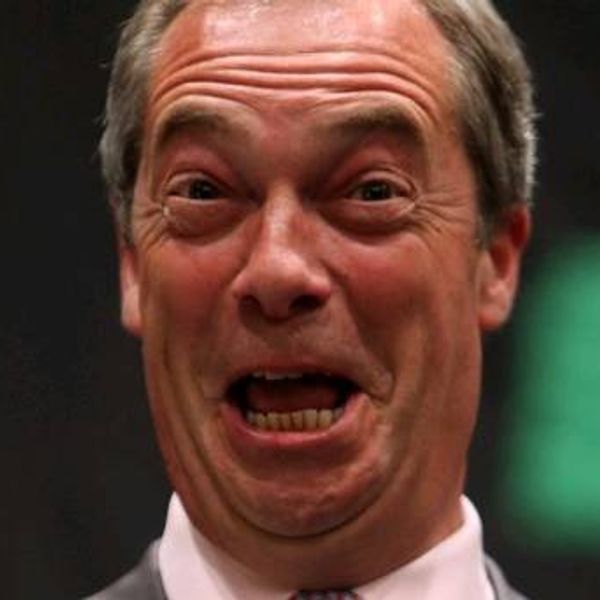Last Thursday, a slim majority of the British people decided to crash their economy by voting for their country to leave the European Union.
This "Brexit" (British exit) referendum passed a national vote by a margin of 51.9 percent in favor to 48.1 percent against, ending 43 years of EU membership and throwing their economy into chaos. Within one day, the value of the British pound plunged from $1.50 to $1.33—its lowest level since 1982—a
nd France overtook the UK as the fifth-largest economy in the world. The pound isn't just underperforming against the U.S. dollar, though, as pointed out by this Financial Times headline:British Prime Minister David Cameron announced his resignation immediately after the referendum passed. Cameron was not the only one upset, though—the First Minister of Scotland is calling for another vote for Scottish independence from the UK, since the people of Scotland overwhelmingly voted against the Brexit and apparently might feel a stronger loyalty to the EU than to the UK. The sentiment is echoed in Northern Ireland, where the Deputy First Minister Martin McGuinness has suggested leaving the UK and joining the nation currently named Ireland to form a united Ireland.
Why did the British voters choose something to blow up their economy and fracture their united kingdom? It was partially because they were lied to: The pro-Brexit Leave campaign has falsely claimed that the UK "sends 350 million pounds per week" to the European Union. Based on this figure, which about half of the British public believed to be true, the Leave campaign pledged to allocate the money to the British healthcare system (the NHS) if Brexit passed. One hour after Brexit passed, pro-Brexit politician and leader of the UK Independence Party (UKIP) Nigel Farage disowned the pledge and called it "a mistake."
Speaking of Nigel Farage and mistakes, after the Brexit vote was announced, he proudly declared that the victory had come "without a bullet being fired." Except anti-Brexit politician and humanitarian campaigner Jo Cox was murdered by a man who shouted "Britain first!" before gunning her down one week earlier. Whoops.
Many Britons who voted pro-Brexit regret their vote and did not actually want to leave the EU. Some voted Leave because they thought that the Stay vote would win and that their vote would not matter. Some did it to help the British economy, believing the "350 million" lie, and immediately regretted their decision after the value of the pound plummeted. Some simply wanted to express their frustration with the EU, but did not really want to leave. And many voters, according to Google Trends, did not know what they were voting for—the top two questions that the British asked Google after the Brexit vote were "What does it mean to leave the EU?" and "What is the EU?"
Another tragic fact about this situation is that the younger that voters were, the less likely they were to vote Leave. In other words, "the generations with the least to lose have piled economic misery on young people's heads." The longer a British voter has to live with the Brexit, the less likely they are to have voted for it.
But why should an American care about any of this? It's just a problem for British people, right? Wrong.
International economics has something in common with Buddhism: both of them teach that everything is connected. More specifically, panic following the Brexit destroyed over $2 trillion in wealth on the global market, and our stock market had its worst day in almost a year. The S&P 500 stock market index felt its largest drop since November 2011 (5.4 percent) and lost all of its gains from this year. To boot, the Dow Jones index joined the S&P in its downward tumble, falling more than 600 points or about 3.4 percent. Brexit was an unnecessary disaster for the global economy.
Speaking of unnecessary disasters, American presidential candidate and herald of the apocalypse Donald Trump decided to get involved. While in Scotland, he tweeted, "Just arrived in Scotland. Place is going wild over the vote. They took their country back, just like we will take America back. No games!" Indignant, the people of Scotland replied to his tweet with a glorious firestorm of Scottish anger and quite a few creative insults, including but not limited to "you muppet," "you clueless numpty," "you weapons-grade plum," "you utter and complete eejit," "you bloviating flesh bag" and several more colorful insults that I probably shouldn't include in this article.
The long-term effects are still uncertain, and they are worrying a lot of people. Apparently Scott Montgomery is not among them, though, as he tweeted on Thursday: "I'm not worried, when has a combination of nationalism and economic depression ever resulted in something terrible happening in Europe?"
Still, there is a glimmer of hope in this catastrophe. The Brexit vote is not legally binding, and an online petition to trigger a second referendum was so popular that it crashed the UK government's petition website. If a petition on that website achieves over 100,000 signatures, then the British parliament is required to consider holding it for debate—and this petition had over 560,000 signatures as of 10:00 PM Friday night.
There is hope that the British people could reverse this horrible decision before it is too late. For now, though, we non-Britons can only watch and wait.
For more information on this subject, check out some of the following resources:
Last Week Tonight with John Oliver: "Brexit"
BBC: "The UK's EU referendum: All you need to know"
CNN: "The non-Brit's guide to Brexit"
The New York Times: "Brexit: Explaining Britain's Vote on European Union Membership"






















